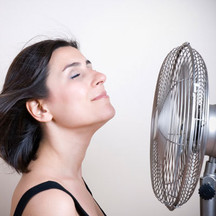Posted by Healthline, Unity Point, NCOA on Dec 30th 2024
Natural Solutions for Menopause

Menopause is a natural phase in a woman's life that typically occurs between the ages of 45 and 55, marking the end of her reproductive years. While this transition is a normal biological process, it can bring about various symptoms that may affect daily life. Fortunately, there are several natural solutions that can help alleviate these symptoms and support overall well-being during menopause.
Common Symptoms of Menopause
During menopause, women may experience a range of symptoms, including:
- Hot Flashes: Sudden feelings of warmth, often accompanied by sweating.
- Night Sweats: Hot flashes that occur during sleep, leading to disrupted rest.
- Vaginal Dryness: Decreased lubrication can cause discomfort during sexual activity.
- Mood Changes: Fluctuations in mood, including irritability and anxiety.
- Sleep Disturbances: Difficulty falling or staying asleep.
Natural Solutions for Menopause
- Herbal Supplements
- Black Cohosh: This herb has been shown to help reduce hot flashes and night sweats. Some studies suggest it may have estrogen-like effects that alleviate menopausal symptoms 1 2 .
- Red Clover: Rich in isoflavones, red clover may mimic estrogen in the body and help reduce hot flashes. It has also been linked to improved cardiovascular health during menopause 2 4 .
- Evening Primrose Oil: Known for its gamma-linolenic acid content, evening primrose oil may help with hot flashes and night sweats, although research results are mixed 1 2 .
2. Phytoestrogens
Consuming foods rich in phytoestrogens can help balance hormone levels naturally. Foods such as:
- Soy Products: Tofu, tempeh, and soy milk contain isoflavones that can mimic estrogen.
- Legumes and Whole Grains: Incorporating lentils, chickpeas, barley, and oats into your diet can provide additional phytoestrogens.
3. Lifestyle Changes
- Regular Exercise: Engaging in physical activity can help manage weight, improve mood, and reduce hot flashes. Activities like walking, yoga, and strength training are beneficial 3 9 .
- Stress Management Techniques: Practices such as mindfulness meditation, deep breathing exercises, or yoga can help alleviate stress and improve emotional well-being during menopause 5 9 .
- Healthy Diet: A balanced diet rich in fruits, vegetables, whole grains, and healthy fats supports overall health and can mitigate menopausal symptoms.
4. Vitamins and Minerals
- Calcium and Vitamin D: Essential for bone health, especially since menopause increases the risk of osteoporosis. Incorporating dairy products or fortified alternatives can be beneficial 9 .
Conclusion
Menopause is a significant life transition that can be managed through various natural solutions. By incorporating herbal supplements, phytoestrogens, lifestyle changes, and essential vitamins into your routine, you can alleviate many menopausal symptoms. However, it’s important to consult with a healthcare provider before starting any new supplements or making significant lifestyle changes to ensure they are appropriate for your individual health needs. Embracing this phase with knowledge and support can lead to a healthier and more fulfilling life during menopause.

